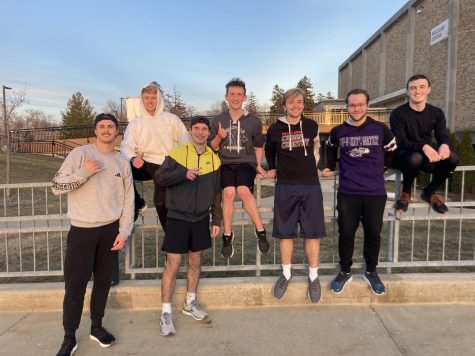Whitewater ducks and AI-generated selfies
February 6, 2023
Does Whitewater have a duck problem? Whether you’re walking around the UW-Whitewater campus, buying four cases of Ramen at Wal-Mart, or socializing at a local bar you will spot them. These ducks are not of the orange webbed feet and feathers variety however, they are of the selfie enthusiast variety, what is commonly known as the “duck face”. The “duck face” isn’t the only variety of selfie species that are native to the Whitewater area either, look closely and you will see such majestic creatures as the “model pout”, “kissy face”, or “hair curtain”. While semi-bizarre to encounter from a distance, they are not a danger to the community. However, recently, a growing concern for the various “selfie species” themselves has been raised by several data privacy groups.
In early December, the viral sensation of Lensa took the social media world by storm with its AI-generated “Magic Avatars”. Many selfie enthusiasts used the platform’s Neural Network Model – Stable Diffusion, to generate artsy selfies by uploading their photos to the app. Stable Diffusion is a deep learning image synthesis model used in a variety of applications to generate images. Similar AI-generated selfies tools are also available on Tik Tok as well. Taking pictures or selfies and uploading them to social media or sharing them on apps such as Tik Tok, Instagram, or BeReal have become commonplace in today’s world, especially amongst younger demographics. In fact, according to DataReportal.com, the (18-29) demographic accounts for 86% of users on Facebook and 67% on Instagram. Additionally, ages 15-35 account for 87% of SnapChat users, and a staggering 92.39% of TikTok users.
Concern about these platforms’ use of images to train AI-models touches on several areas, however one important area is data privacy. The concern over what is being done with these images, the data that is being collected adjacent to them, how they are stored and how securely, or whether or not data is being sold to third parties are all topics of interest for data privacy advocates. These sensitive topics are not necessarily new news though, Lensa is just the most recent app to be subjected to public scrutiny over its data practices. UW-Whitewater Professor and Cybersecurity Program Coordinator, Dr. Zachary Oster, “It’s become standard practice, if you’re running a website to explain what data you’re collecting and how you’re going to be using it in a privacy policy.” However, a Deloitte survey found that 91% of users consent to legal terms and services conditions without reading them. In fact, for ages 18-34 the rate is 97%.
Is it really necessary to read the agreements though? What is the big deal? You have 40k of student loan debt, a pile of dirty laundry, and four cases of Ramen to your name. Is someone coming after your Ramen? (Lock up that Ramen!) So what if my data is being used to send me more ads for Starbucks Pumpkin Spice Lattes or the next blow out sale on Ramen? UW-Whitewater Junior, Abby Ross, who has used some of the AI-generated selfie apps, like many people, was not particularly concerned about the possibility of finding a few more promotional junk emails. “My real concern when it comes to social media is personal safety, which is why I don’t disclose my location, and all of my accounts are private”. It would appear as though most people are not overly concerned about the misuse of their data.
However, Dr. Oster explained, “Any time you’re giving data to a website, a company, to another person even, you’re putting some trust in that person or company to handle your data responsibly.” Yet, it is not just that particular company either, as he explained,
“You have many companies who sell your data to other companies, which is the business model for many apps, especially free apps.” With such a large majority of social media users representing the same younger demographic which can’t be bothered to read a privacy agreement, is there potential for consequences to emerge later down the road? Commonly, you will hear students complain that school does not teach students practical life knowledge. To some, trigonometry is cute, however learning how to file taxes seems a more applicable life skill. The question then becomes are we at a point which topics concerning cyber security and privacy should also be considered a basic life skill that should be addressed by schools and parents? Dr. Oster believes we are, “We are at the point now where we should be teaching that [internet security and privacy] in schools because it has become a life skill.” #KeepOurDucksSafe.






















